Contents:
![]() Induction into the Army Air Corps
Induction into the Army Air Corps
![]() Grounded and wounded, but alive
Grounded and wounded, but alive
![]() The
German, the White Russian and me
The
German, the White Russian and me
![]() The Frankfurt
The Frankfurt
interrogation center
![]() Eat, drink, smoke, and be
Eat, drink, smoke, and be
creative
THE 91ST BOMB GROUP 324TH BOMBARDMENT SQUADRON
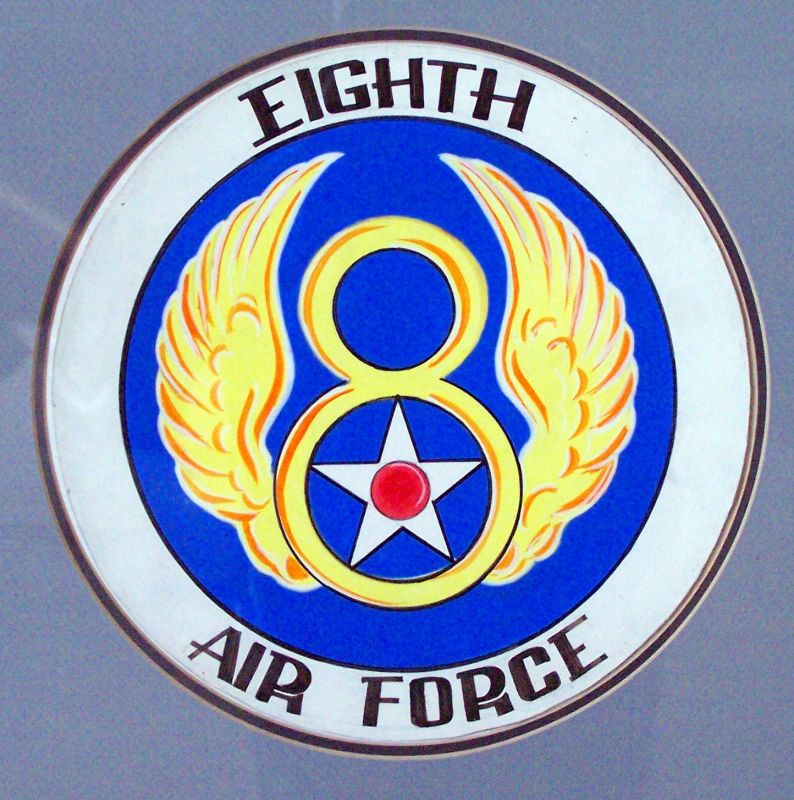
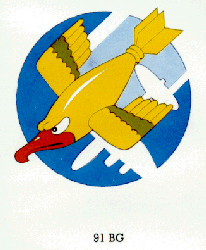
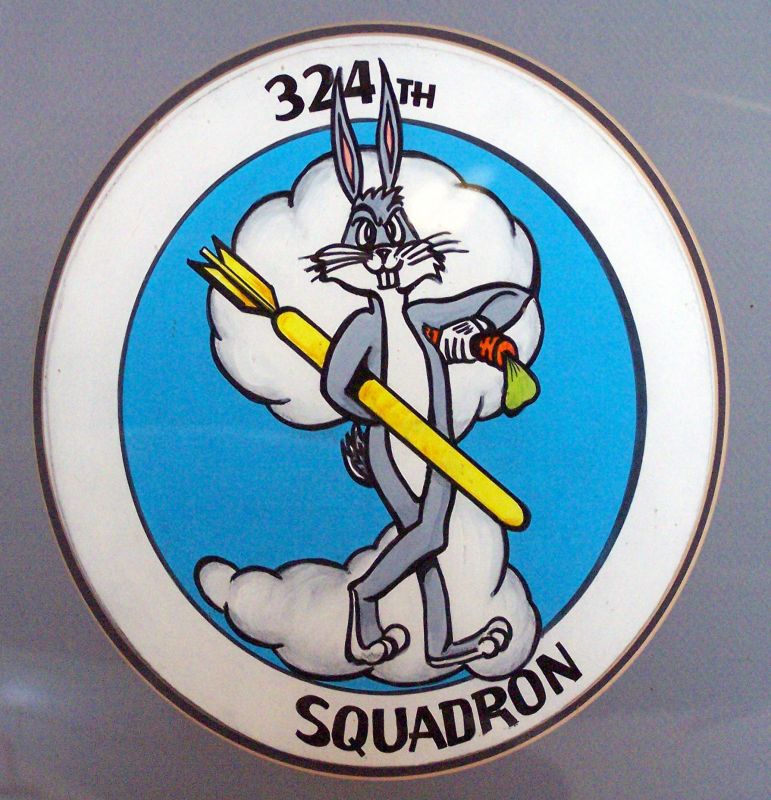
![]()
Tail marking is a letter A within a triangle
The 91st was stationed at Bassingbourne, England, a few miles north and east of London. The base was an old Royal Air Force base that had been taken over by the United States Army Air Corp. It had permanent buildings and was a nice base. The geography was flat farmland.
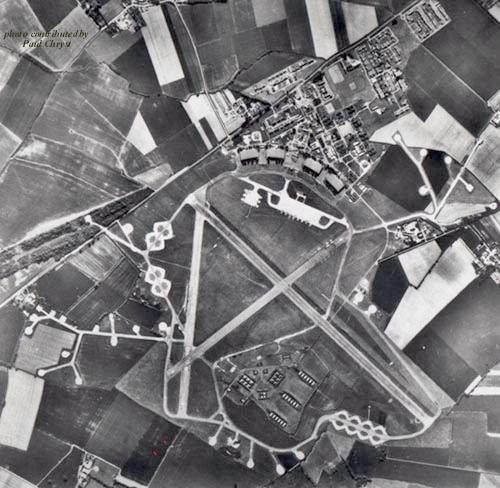
Air view of Bassingbourn Base
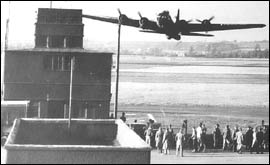
Bassingbourn Tower
I shared a room with the bombardier in the officer's club over the bar. There was a common bathroom down the hall about 20 steps away that we shared with 12 to 14 people.
One end of the hall had five to six rooms and a bath, and the other end was the same with another common bath. Each room housed two people. Stair steps went down to the first floor where the officer's club bar and mess were located.
There was a very definite shortage of toilet paper, and what English toilet paper we had was of the lowest quality. So I wrote home and asked them to send us toilet paper. Hazel (my future wife) thought this was a joke and in the next letter sent six sheets of toilet paper. It was no joke using English paper that had a slick finish.
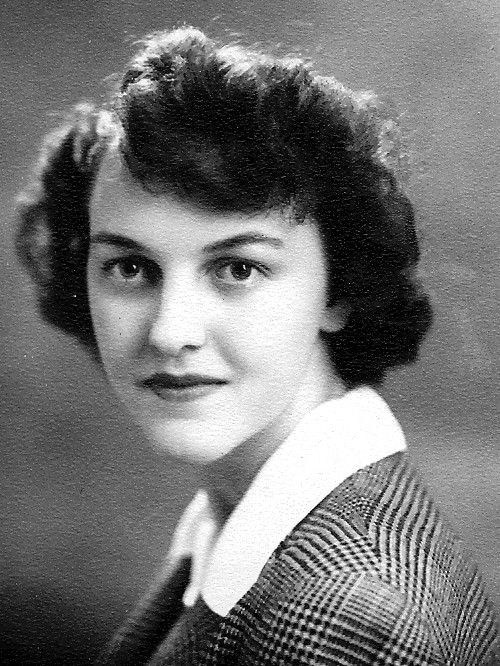
Hazel Louise Phillips [later Moore]
There was a little Scottish terrier there named Bourbon who had been owned by a crew that had also been shot down. He was then passed to another crew that had been shot down. No one would have anything to do with the dog because they believed he was bad luck. I didn’t believe in that, so I adopted him. Two weeks later I was shot down. I have no idea what finally happened to the dog. Every Friday night, the base was opened so the townspeople could use the facilities. After the night's festivities, it was not uncommon for officers to take their dates back to their rooms. Frequently, they did not clear the base of townspeople until the following Thursday.
We were bombed while we were there, we watched the Germans come over at night on their bombing runs. We could see the anti-aircraft searchlights. They would fix on a German plane and the anti-aircraft batteries would fix on the plane. Although I never saw a German plane shot down, the bullets and shrapnel would frequently hit casual observers on the ground.
Ice Cream was fairly common in the mess hall. To get it, the mess sergeant would mix the ingredients, take it to squadron, climb aboard a B-17, and fly to an up high enough that the ice cream would freeze at the reduced temperature. This was probably the world’s most expensive ice cream. About two o’clock one morning, the bombardier and I heard a commotion in the hall. We heard a guy pull back the bolt and put a Thompson 45 submachine in battery. We knew what that was and hid under the bed. The guy sprayed the hall with bullets. He was finally subdued. It had been a case of stress and they shipped him home. Any day there was to be a mission, those of us who were flying that day were rousted from sleep at about 3:00 a.m. We would go to mess for breakfast, and then report to the squadron operations office to dress in our flight suits. From there, we would go the group briefing to get the mission overview. After the group briefing, there were individual briefings for pilots, navigators, bombardiers, gunners, and radiomen. Afterwards we were transported from the barracks area to the airplanes by truck.
A mission might have a flight time ranging from six to 12 hours. On the longer missions, there was concern about taking off because of the heavy load of fuel and bombs on the plane. The runway length became critical. There were times that pilots pulled up too quickly, causing their plane to stall on takeoff which resulted in a "crash and burn" and the loss of all the crew.
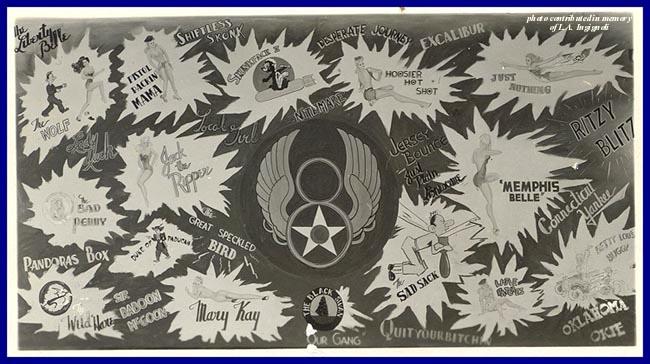
324th Squadron Board
Our regular plane was named "The Wolf". As soon as the plane was airborne the bombardier would go back to sleep. He knew he wouldn’t be needed until much later in the mission. The navigator, on the other hand, was busy all the time. At the start of a mission, the navigator plotted the course to the group rendezvous point. After the rendezvous, there were still calculations regarding the rate of climb and the rate of fuel consumption as the plane achieved altitude.
After that, I could rest until we ran into enemy action. The navigator was responsible for recording all flight events such as conversations over the radio, the location, time of lost planes from the group, and the number, group, and types of enemy fighters. In addition, I had to know where our plane was at any given moment. I had to pinpoint the location of enemy anti-aircraft gun placements, and used our location to determine how to head back home in case our plane had to abort the mission. The navigator log was used in the interrogation when we returned from the mission.
The food was excellent although it was dehydrated. Meat was hard to come by. Typically we had better food than the populace of England had, and much better food than the typical soldier had.
Civilian clothing was rationed using stamps. We had all the stamps we could use on the air base. When we went into town we would take ration stamps to buy clothing to send back home and for local girlfriends.
I went into a store in Cambridge and bought a pair of kangaroo gauntlet mittens for Hazel. The sales girl said, "That will be -- ration stamps." I said, "I don’t have any ration stamps." She said that she would give me some of hers. This was quite a sacrifice because they didn’t have enough ration stamps to properly clothe themselves. The next time I went to Cambridge, I reached into the stamp bowl at the base and took a large handful to this girl. She was so pleased. She was a very pretty little girl, but I have no idea what happened to her. I bought a bicycle to ride around the base and I bought lots of clothes from the quartermaster. I probably had six or seven blouses (the officer coat) in two colors, pink and green and probably 15 or 20 pairs of slacks in the same colors. You could mix and match, green and pink or wear the same colors. At that time I was 6’1" and weighed 135 pounds with a 28" waist and 32" inseam. Later, when I got out of the prison camp I would weigh 6 ½ stone (a stone being 14 pounds). Six months after that, my gear was sent to me. By then, I was 6’1", 185 pounds and had a 34-inch waist. My thighs had picked up weight to the extent that I couldn’t put on the slacks. Also the coats were much too small for me. I had to sell all of them for a tenth of what I had in them.
